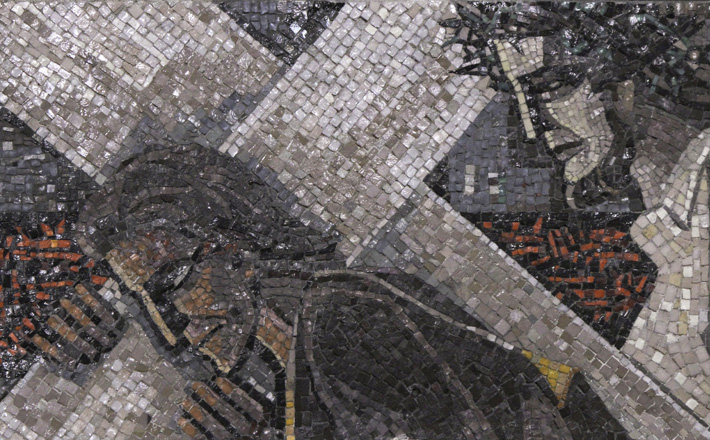Commentary on Psalm 69:7-10, [11-15], 16-18
It was my favorite children’s game for a summer evening.
There was a whole street-full of players, including some of the “older kids” and then those of us who were in grade school. It was a more sophisticated variation of the simple “hide and go seek” game, called “beckon.” One person was “it.” That person covered his or her eyes and counted out loud to one hundred. During that count every player hid somewhere in the neighborhood. With the cry “Here I come, ready or not,” the one who was “it” searched for other players and when one was found, shouted “Rose Ann” (or “Jimmy”) go to my den! The “den” filled up with prisoners and those in it called out, “beckon, beckon, I want a beckon.” Then one of the other players made a beckoning arm motion, hoping not to be seen, hoping to free those imprisoned. So it went on by the hour, until everyone was in the “den,” or everyone had escaped.
In this psalm it’s God who is hiding. There are some 16 cries for help, but there seems to be no answer. The psalmist’s urgent cry comes to sharp expression in verse 17 (the antiphon):
Do not hide your face from your servant,
for I am in distress — make haste to answer me.
The psalm consists of the typical elements of a lament, a prayer in time of trouble. For a good example of an individual lament see Psalm 13, which contains a complaint in you, I, and they forms (verses 1-2), a cry for help (verses 3-4), an affirmation of trust (verse 5) and a vow to praise (verse 6).
Especially frequent in Psalm 69 are desperate cries for help. Here is a volley of 911 calls to God expressed in 16 of the psalm’s 36 verses: verses 1,6,13-18, 22-29. There are also a good number of complaints: verses 2-4, 7-12, 19-21, affirmations of trust (verses 5, 33) and a vow to praise (verses 30-36). Verses 35-36 locate the psalm sometime after the fall of Jerusalem in 587 BCE.
The psalm falls into three major sections, each issuing a call for God’s help:
1. Save me, God! (verses 1-6). The one who prays this psalm is desperate, even near death. The situation is described in a powerful mixture of metaphorical and literal language. The psalmist is about to drown, sinking in a pit of quicksand, so tired and worn out that he or she can no longer see straight (verses 1-3). Verse 4 hints that the one praying has been falsely accused of stealing. The psalmist trusts that God knows what he or she has done or not done (verse 5). Verse 6 sounds an important note: the one praying is concerned about the others in the community.
2. Set me free, Lord! (verses 7-18). Verses 7-9 present an “I” complaint that adds information about the situation of the one praying. Is the psalmist being persecuted by others because he is helping to rebuild the temple? Is the psalmist’s enthusiasm drawing the fire of neighbors (verse 9)? Verses 10-12 continue with they-complaints about others in the community. Verses 13-18 are desperate cries for help and are at the core of the psalm. Like a drowning person, desperately hitting 911, we hear: “Answer me… rescue me…do not hide your face…set me free.”
3. O God, protect me! (verses 19-36). Here are “they complaints” about enemies (19-21) and wishes for their punishment (22-28), a final call for God’s protection (29) and a vow to praise with a concluding affirmation of trust in verse 33.
According to the New Testament, when those who lived at the time of Jesus observed what he said and did, they often made connections with this psalm.
At the beginning of his work (according to John’s Gospel), when Jesus chased the commercializers out of the temple, his disciples remembered words from Psalm 69:9, “Zeal for your house will consume me” (John 2:17). When Jesus spoke of the hatred his followers would experience he referred to Psalm 69:4, “They hated me without cause” (John 15:25). When Jesus was near death on the cross he said “I am thirsty” and was offered sour wine; John understood this as a fulfillment of Psalm 69:21 (John 19:28); see also Matthew 27:34; Mark 15:36; Luke 23:36. Finally, Acts 1:20 gives an account of the death of Judas that is understood as a fulfillment of Psalm 69:25.
Paul made reference to the Septuagint translation of Psalm 69:23 and 24 in Romans 11:9-10. In Romans 15:3, Paul understands the insults of opponents in terms of Psalm 69:9b. Thus the earliest Christians linked events running from the beginning of Jesus’ ministry to the cross and beyond, to Psalm 69.
There are a good number of ties between Revelation and Psalm 69. Revelation 16:1 appears to pick up the theme of the pouring out of God’s wrath from Psalm 69:24. The “book of the living” theme in 69:28 (also Psalm 40:7) recurs in Revelation 3:5; 13:8; 17:8; 20:12; 20:15; 21:27.
Certainly the royal psalms such as 2 and 72 help us to answer the question, “Who is Jesus?” Their emphasis is on the one named Messiah.
It is evident that with its portrayal of a servant of God who is suffering, Psalm 69 has something to say to that question, too. And there was a word of Good News to those suffering in the present, but who could be confident not only of their heavenly Father’s care (Matthew 10:29 and today’s Gospel) but also that their names were written in “the Lamb’s book of life.” (Revelation 21:27; Psalm 69:28).


June 22, 2014